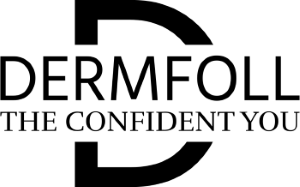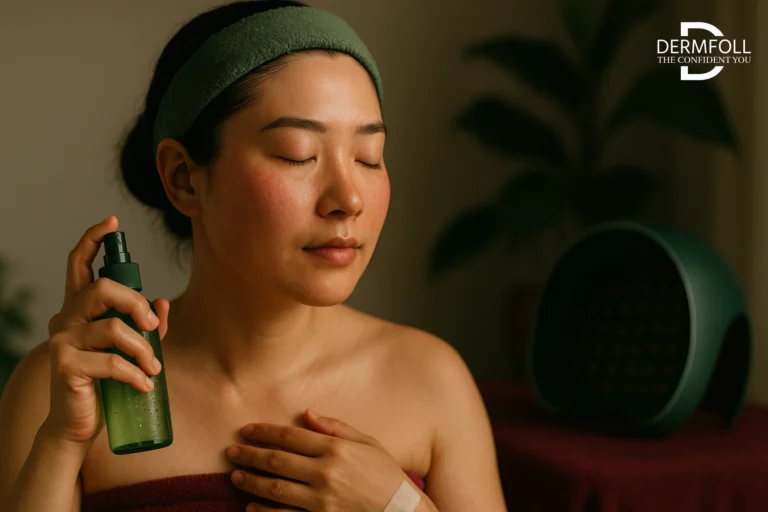With your present skincare regimen, are you unintentionally disrupting your skin moisture barrier your skin? Many people nevertheless suffer with dry, flaky skin even though they spend in luxury goods. Maybe this annoying reality results from ignoring how skin moisture barrier effects your your skin health.
We have discussed What Is TEWL in Skin Care and How to Prevent It. Today’s piece will explore the nine finest tropical supplements available to upgrade your skincare regimen. You will learn why these natural gems are effective at preserving good, hydrated skin and how easy they may be to include into your everyday schedule.
Welcome to DERMFOLL, By the time this article ends, you will know exactly the best tropical supplements—from hydrating serums to occlusive moisturizers and oils. We will also discuss important components including ceramides and hyaluronic acid that are absolutely vital for skin hydration.
All set to transform your skincare regimen? Let’s explore the top nine tropical supplements meant to keep your skin shining and nourished.
Best Supplement For Skin Hydration: Tropical Supplements
Skin hydration is an essential part of keeping healthy, robust skin. Tropical supplements can efficiently replenish and improve skin moisture.
This section discusses the types of tropical supplements that have been shown to increase skin moisture.
What Type Of Tropical Supplements Help With Skin’s Moisture Levels?
How Do Tropical Supplements Transform Skin Moisture Levels?
Moisturizers are the foundation of every skincare routine designed to improve skin hydration. For Preserving moisture in the skin and for Preventing water loss.
Moisturizers are mainly divided into three types:
- Occlusives: You must have herd of petrolatum jelly and mineral oils. when used correctly they create a barrier on the skin’s surface, keeping that good moisture lock in.
- Humectants: “a substance that promotes retention of moisture” . These attract water from the environment. Also from the deeper skin layers to the surface as a result of healthy hydration habits. Glycerin, hyaluronic acid, and urea fall into the domain of Humectants .
- Emollients: They find gaps between your skin and fill them up. These fill the spaces between skin cells. Giving your skin a softer and smoother feel. Ingredients like lanolin, squalene, and plant oils are effective Emollients.
A study demonstrated the effects of a moisturizer containing glycerin, and Centella Asiatica extract. It showed a significant increase in Skin moisture barrier function up to 24 hours after application
How Do Serums Act as Potent Hydrators in My Skincare Routine?
Serums are lightweight, fast-absorbing liquids. Designed to deliver high concentrations of active ingredients directly to the skin. Typically used after cleansing and before moisturizing. Magnifying the efficacy of your skincare routine.
They are commercially available in formulas that contain hydrating agents. hyaluronic acid, peptides, and vitamins being some of them.
That same study also reported serum containing hyaluronic acid and Centella Asiatica showed significant improvements in Skin Moisture Barrier function
How Do Natural Oils Help Unlock Optimal Skin Moisture Barrier?
For people who prefer a more natural alternative, oils may very well fit the bill. Oils are rich in fatty acids and lipids that help to restore the skin’s barrier function and retain moisture.
With particular benefits to dry and dehydrated skin types. Oils can be used alone. However can also be layered over serums and under moisturizers for added hydration.
- Coconut Oil: Known for its emollient properties as mentioned above, coconut oil helps with increase in skin hydration.
In a clinical trial, virgin coconut oil showed a significant reduction in SCORAD index. ( a scale used to assess the severity of atopic dermatitis A.K.A eczema) . With improvement in skin Hydration in pediatric atopic dermatitis patients
- Argan Oil contains vitamin E and vital fatty acids. Argan oil is an effective Skin Moisture Barrier booster, it softens and hydrates the skin.
How Do Hydrating Masks Influence Moisture Levels In Skin ?
Hydrating masks provide a substantial Skin Moisture Barrier boost to the skin. They are traditionally left on the skin for a while before being washed off or absorbed.
Masks are made with a variety of moisturizing ingredients. Components include hyaluronic acid, glycerin, aloe vera, and plant extracts.
- Sheet Masks: These masks are made of fiber or gel and soaked in a moisturizing serum. This helps to offer instant hydration.
- Cream Masks: These have a thicker consistency. Often applied overnight to deeply hydrate the skin.
What Are Some Key Ingredients in Topical Supplements for Skin Hydration?
How Does Glycerin Attract Moisture to Hydrate Dry Skin?
Glycerin is another highly effective humectant. It is well recognized for its ability to draw moisture from the environment into the skin. Attracting water from the air and the deeper layers of the skin.
Glycerin also plays a vital role in maintaining the skin’s moisture balance. Due to its hydrating properties, glycerin is a common ingredient in a variety of skincare products. Used as an essential component for dry and dehydrated skin.
How Does Hyaluronic Acid Enhance Skin Moisture Barrier and Elasticity?
Hyaluronic acid is a powerful humectant. Known for its exceptional ability to attract and retain moisture. It’s so potent that it can hold up to 1,000 times its weight in water. making it a key ingredient for intense skin hydration.
Hyaluronic acid, which is naturally present in the skin, helps to keep it firm and hydrated.
Its moisture-binding properties improve skin elasticity. It creates a cushioning effect that reduces the visibility of fine lines and wrinkles. Hence, it is a staple in formulations aimed at skin recovery and rejuvenation.
What Are Some Key Ingredients in Topical Supplements for Skin Moisture Barrier?
How Does Glycerin Attract Moisture to Hydrate Dry Skin?
Glycerin is another highly effective humectant. It is well recognized for its ability to draw moisture from the environment into the skin. Attracting water from the air and the deeper layers of the skin.
Glycerin also plays a vital role in maintaining the skin’s moisture balance. Due to its hydrating properties, glycerin is a common ingredient in a variety of skincare products. Used as an essential component for dry and dehydrated skin.
How Does Hyaluronic Acid Enhance Skin Moisture Barrier and Elasticity?
Hyaluronic acid is a powerful humectant. Known for its exceptional ability to attract and retain moisture. It’s so potent that it can hold up to 1,000 times its weight in water. making it a key ingredient for intense skin hydration.
Hyaluronic acid, which is naturally present in the skin, helps to keep it firm and hydrated.
Its moisture-binding properties improve skin elasticity. It creates a cushioning effect that reduces the visibility of fine lines and wrinkles. Hence, it is a staple in formulations aimed at skin recovery and rejuvenation.
How Do Moisturizers With Ceramides Help With Skin Hydration?
Ceramides are a type of natural lipid. Found in high concentrations within the cell membranes. specifically in the outer layer of the skin. They maintain the skin’s barrier function by decreasing transepidermal water loss (TEWL). As discussed in previous articles,.
Moisturizers with ceramides protect against environmental aggressors. They achieve this by filling in the gaps between skin cells. Ceramides help to lock in moisture. Strengthen the skin’s natural barrier. and enhance its ability to retain hydration.
This results in resilient skin that is better protected from dryness and irritation. Ceramides are particularly beneficial for those with dry, sensitive, or aging skin. As they help restore and maintain the integrity of the skin barrier.
How Does a Hyaluronic Acid and Ceramides Moisturizer Enhance Skin Moisture Barrier?
The formulation of hyaluronic acid and ceramides moisturizers offer complementary effects.
- Hydration and Moisture Retention:
- Hyaluronic Acid is a powerful humectant, meaning it attracts and holds onto moisture from the environment and deeper layers of the skin, helping to keep the skin plump and hydrated. It can hold up to 1,000 times its weight in water.
- Ceramides strengthen the skin’s natural barrier, preventing moisture loss by locking water within the skin’s layers. This enhances the skin’s ability to retain moisture.
- Barrier Repair and Protection:
- Ceramides are essential lipids that help restore the skin’s barrier function. They fill in the gaps between skin cells, much like mortar between bricks, ensuring the barrier is intact and able to protect against external aggressors.
- Hyaluronic Acid works to keep the skin hydrated from within, which in turn supports barrier function. Well-hydrated skin is more resilient and less prone to damage.
- Soothing and Reducing Inflammation:
- This combination helps calm irritation by providing a balance between deep hydration and Skin Moisture Barrier. Ceramides specifically work to reduce trans-epidermal water loss (TEWL), which is often the cause of skin irritation.
- Anti-Aging Benefits:
- The combination can smooth fine lines and wrinkles. Hyaluronic Acid plumps the skin from within, reducing the appearance of wrinkles by filling in the spaces between collagen and elastin fibers.
- Ceramides help maintain a youthful skin appearance by reinforcing the skin’s structure, thus preventing sagging and further aging.
- Improvement in Skin Sensitivity:
- Ceramides are beneficial for sensitive skin types as they reinforce the skin’s protective barrier, making it more resistant to environmental irritants, while Hyaluronic Acid hydrates without causing irritation.
The combination of hydrating and barrier-repairing ingredients is quite efficient at maintaining hydrated, and resilient skin.
How Does Hydrolyzed Collagen Support Skin Repair and Elasticity?
A form of collagen that has been enzymatically or chemically processed into smaller peptides. Making it more easily absorbed by the skin. Collagen is a major structural protein in the skin. This compound’s presence is critical for maintaining skin firmness and elasticity.
When applied topically, it provides your skin with amino acids, which are necessary for repair and regeneration. It also enhances moisture retention and boosts skin elasticity. Also contributes to reducing the appearance of fine lines and wrinkles.
Hydrolyzed collagen is often included in anti-aging and skin-recovery formulations. As it is exceptional at supporting the skin’s natural repair processes.
How Do Nanostructured Lipid Carriers (NLC) Enhance Skin Hydration and Barrier Function?
Imagine you have a blend of butter and oil. When you mix them together, you get a smooth, creamy mixture that’s simple to spread.
This is similar to how nanostructured lipid carriers (NLC) are made. I.e., they are composed of a solid lipid matrix blended with liquid lipids.
They are designed to encapsulate and deliver active ingredients like vitamins and collagen peptides. They are also used to deliver anti-aging formulations like coenzyme Q10 and niacinamide.
At times, the amount of active ingredients may not be effectively absorbed by their own. In such predicaments, nanostructured lipid carriers (NLC) enhance the stability. And bioavailability of these active ingredients.
Their MO is to create an occlusive film that locks in the moisture and delivers desired compounds. This occlusive layer helps to lock in moisture, keeping the skin hydrated for a longer period.
The lipid matrix in NLCs mimics the natural lipids found in the skin. Supporting the repair and maintenance of the skin barrier.
This agent’s most commendable attribute is that it provides sustained release of active ingredients. Ensure prolonged hydration and a consistent supply of active ingredients for your skin. Enhancing overall skin hydration and barrier function.
How Do N-Acetylcysteine (NAC) and Panthenol on Skin Improve Skin Hydration?
NCA is an effective antioxidant. It replenishes intracellular levels of glutathione. It serves as a crucial antioxidant in the skin. Its purpose is to protect the skin tissue from oxidative stress and damage.
By reducing oxidative stress and inflammation, NAC maintains the integrity of the skin barrier. Enhancing overall skin hydration and calming irritated skin. NAC’s contribute to stabilizing cell membranes.
Assisting cellular repair processes. And further boosting the skin’s ability to retain moisture. NAC is an effective agent at improving skin texture and resilience.
According to a study, N-Acetylcysteine (NAC) showed improvements in skin hydration from 36.2±9.9 AU to 48.8±15.7 AU in healthy volunteers I.e. a 12 point increase. And from 35.6±12.0 AU to 44.7±13.9 AU in individuals with atopic dermatitis.
Panthenol-Containing Emollient (NTP-CE)
A study on Panthenol-Containing Emollient (NTP-CE) was conducted over 22 days. Key ingredients examined included panthenol, vitamin B3 (niacinamide), α-Glucan Oligosaccharide.
Now that we have set the context. Let’s examine these ingredients as distinct entities.
Panthenol acts as a humectant, attracting and retaining moisture in the skin.
Niacinamide increases lipid production.
α-glucan oligosaccharide supports beneficial skin microflora.
How Does Vitamin B3 (Niacinamide) Strengthen the Skin Barrier and Improve Skin Health?
Boosts skin lipid production, strengthening the skin barrier, and reducing water loss. With there anti-inflammatory properties, niacinamide calms the skin. Ideal for sensitive and irritated skin conditions.
For aging and damaged skin, niacinamide improves skin tone and texture. Enhances the appearance of the skin by reducing fine lines and wrinkles.
How Does α-Glucan Oligosaccharide Support Skin Microflora?
We have a tiny echo system that lives in synergy and harmony with our skin. α-Glucan Oligosaccharide Supports this by promoting the growth of beneficial skin microflora. Regulating the Skin Moisture Barrier and maintaining hydration.
This prebiotic ingredient helps to balance the skin’s microbiome. Good bacteria growth helps protect the skin from harmful microorganisms. Also against environmental stressors.
Conclusion
Is It Sufficient to Nourish Your Skin from the Outside?
Through our investigation of The 9 Best Topical Supplements to Hydrate Your Skin Naturally. we have learned how to improve the moisture levels of your skin with the help of moisturizers, serums, oils, and masks. Enhanced with glycerin, hyaluronic acid, and ceramides. You’re making great progress toward a healthier, lively texture by using these powerful topicals in your skincare regimen.
But consider this: Despite the fact that these topical treatments are quite effective. Is there anything additional you can do to increase the hydration of your skin from the inside out? Why not combine this with an oral supplement? Or what about getting acquainted with oral supplements?
Can your skin’s capacity to hold onto moisture. And lessen Transepidermal Water Loss (TEWL) be affected by internal variables like oral hydration?
Are you prepared tounderstand your skincare through a different Lense? Explore the science of hydrating your skin from the inside out in our upcoming piece.









